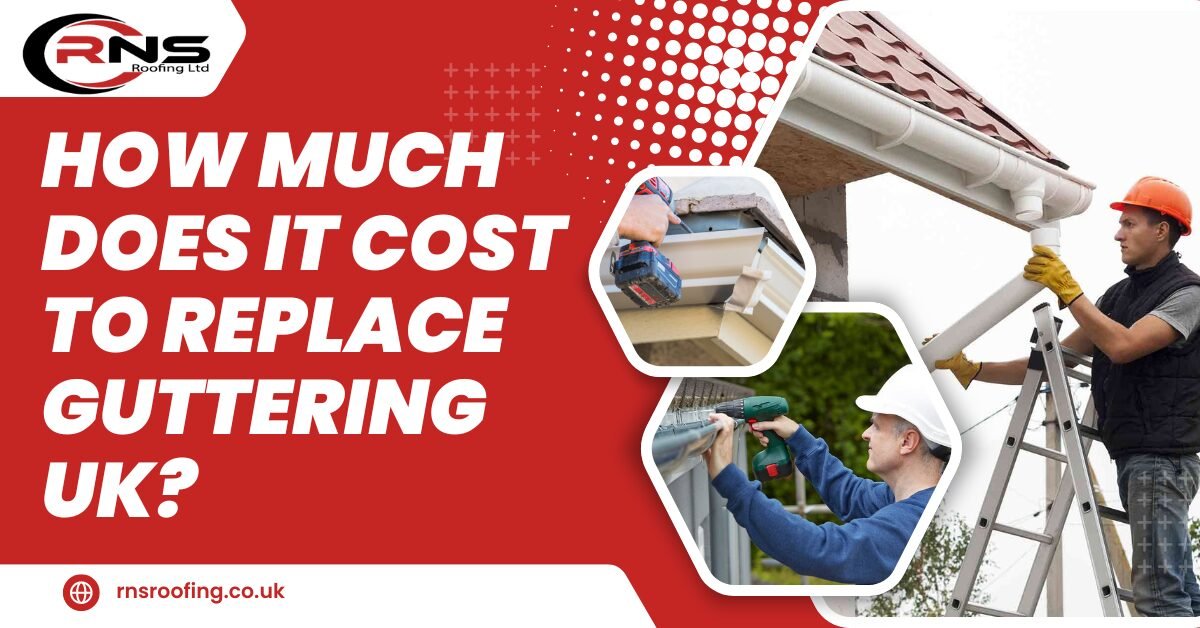Replacing gutters may not be the most glamorous home improvement project, but it is undoubtedly one of the most important. Your home’s gutters protect it from water damage by channelling rainfall away from the roof, walls, and foundation. But how much does it cost to replace guttering UK?
Weathering, rusting, and clogging can all cause gutters to deteriorate over time, reducing their efficacy and putting your property at risk. In this comprehensive guide, we’ll explore the factors that influence gutter replacement costs, compare various materials, and provide insights into maintaining and upgrading your guttering system.

How Much Does It Cost to Replace Guttering UK?
The cost of replacing gutters in the UK typically ranges between £500 and £1,500, depending on several factors. Understanding these factors will help you budget effectively and make informed decisions about your guttering project.
Factors That Influence the Cost
1. Material
The material you choose significantly impacts the total cost and durability of your guttering. Here’s a breakdown of common guttering materials:
UPVC: Inexpensive, long-lasting, and low maintenance, UPVC is a popular choice. Replacement costs range from £30 to £50 per metre.
Aluminium: Lightweight, rust-resistant, and cost-effective, aluminium guttering typically costs between £40 and £70 per metre.
Cast Iron: This traditional material is highly durable with a classic appearance, costing between £50 and £90 per metre.
Steel: Known for its strength and durability, steel guttering is ideal for areas with extreme weather, priced between £40 and £80 per metre.
2. Size and Complexity
The size of your property and the complexity of the guttering system affect the overall cost. Larger homes require more materials and labour, while unique architectural features or custom fittings can increase expenses.
3. Installation Costs
Labour costs play a significant role in the total expense. Professional installation ensures the job is done correctly and safely, with rates typically ranging from £200 to £500 per day, depending on location, accessibility, and contractor expertise.
4. Regional Cost Variations
Gutter replacement costs can vary across the UK. For example, costs in London are generally higher compared to northern regions due to increased labour rates and material availability.
5. Seasonal Impact on Costs
Replacing gutters during off-peak seasons, like winter, can sometimes be cheaper as contractors may offer discounts. However, weather conditions during these times can affect scheduling and overall costs.
6. Additional Expenses
Other costs may include scaffolding for safe access, fittings such as downpipes and brackets, and optional gutter guards to reduce debris build-up and extend the gutter’s lifespan.
Comparative Cost Analysis of Guttering Materials
To help you choose the right material, here’s a quick comparison:
| Material | Cost per Metre | Durability | Maintenance | Aesthetic Appeal |
| UPVC | £30 – £50 | Moderate | Low | Modern and simple |
| Aluminium | £40 – £70 | High | Low | Sleek and clean |
| Cast Iron | £50 – £90 | Very High | Moderate | Traditional |
| Steel | £40 – £80 | Very High | Moderate to High | Industrial look |
Signs That Your Gutters Need Replacing
It’s essential to know when your gutters need attention. Common signs include:
- Leaking or Dripping: Persistent leaks, especially at joints, indicate damage.
- Sagging Gutters: Gutters pulling away from the house may signify broken brackets or excessive weight due to debris.
- Visible Rust or Cracks: These are clear signs that your gutter system is deteriorating and losing its effectiveness.
Gutter Replacement vs. Repair
Sometimes, repairing damaged sections may seem more cost-effective. However, if your gutters are frequently clogged, sagging, or rusting, replacing them might be more economical in the long run. Replacement ensures a fresh start and mitigates ongoing maintenance issues.
Long-Term Savings with Gutter Maintenance
Regular gutter maintenance, such as cleaning twice a year and promptly addressing minor issues, can significantly extend the lifespan of your gutters. Proper maintenance prevents clogs, reduces wear, and saves money on costly replacements.
DIY vs. Professional Installation
While DIY gutter replacement might save on labour costs, improper installation can lead to more expensive problems down the line. Hiring a professional ensures the job is done correctly, reducing the risk of leaks, poor drainage, and structural issues.
Guttering Colour and Style Options
Gutters come in various colours and styles, which can complement your home’s exterior and even increase property value. Options range from basic white UPVC to sleek black aluminium or traditional cast iron designs.
Environmental Considerations
Eco-friendly options, such as recycled aluminium gutters, are gaining popularity. These sustainable materials offer the same durability as traditional options while reducing environmental impact.
Conclusion
The cost of replacing guttering in the UK varies depending on materials, labour, and additional factors like property size and complexity. By understanding these aspects, you can make informed decisions that balance upfront costs with long-term value.
When choosing gutter materials, consider your home’s style, maintenance requirements, and budget. Professional installation, although more costly initially, often saves money in the long run by avoiding common DIY pitfalls. Regular maintenance further prolongs the life of your gutters, protecting your home from water damage for years to come.
FAQs
Can I install new gutters over existing ones to save cost?
While technically possible, it’s generally not recommended as it can cause drainage and stability issues.
How long does gutter replacement typically take?
The timeframe varies depending on property size and installation complexity but usually ranges from a day to a week.
What warranty options are available for guttering material?
Warranty options vary by manufacturer and material type, with some offering warranties from 10 to 50 years.

